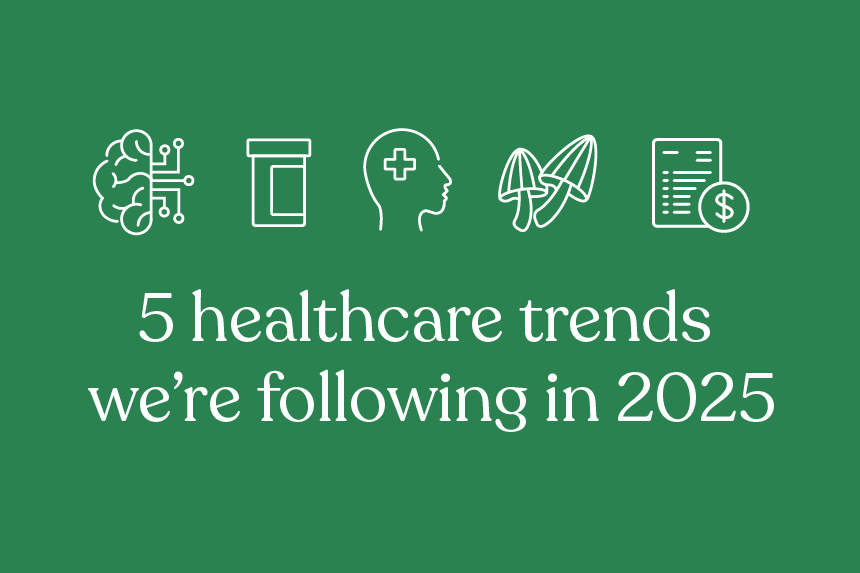It’s time for our annual forecast on what’s in store for the healthcare industry. Insights from our research and discussions with industry experts reveal the technologies, challenges, and healthcare trends that will influence the industry in 2025.
We’ll dive into five key 2025 healthcare trends worth watching, from developments in the healthcare supply chain to new care delivery models and evolving medical cost dynamics. Let’s take a look at the trends we’re most excited about.
1. Artificial Intelligence (AI) will continue to be a transformative force in healthcare
There’s no doubt about it: AI has revolutionized healthcare, driving innovation across the industry. From life sciences to healthcare providers and suppliers, AI is enabling more accurate diagnostics, personalized treatments, streamlined operations, and much more. In 2025, AI’s role will continue to expand further, particularly in areas like drug discovery, predictive analytics, and operational efficiency.
Complementing AI, blockchain technology is set to overhaul the medical supply chain, ensuring transparency and traceability from manufacturers to patients. Together, suppliers can use the two technologies to overcome big problems, including inefficient inventory management, demand fluctuations, disruptions, fraud, and more.
AI will also play a critical role in the future of cybersecurity. As data breaches and hacks become more dangerous (and attempts become more frequent), healthcare organizations will use AI to help detect and mitigate threats in real-time. Read more about how AI will be a transformative force in healthcare here.
2. Life science companies step into the D2C space
Expect to see more device makers and pharmaceutical companies jump on the direct-to-consumer (D2C) bandwagon. Companies like Abbott and Dexcom have paved the way with their continuous glucose monitors (CGMs), while Lilly and Pfizer have ramped up their D2C strategies for medications like GLP-1s.
In our second trends blog, we highlight a growing focus on patient empowerment, allowing consumers to buy drugs and devices straight from manufacturers. While big pharma has historically turned to DTC strategies mainly in response to patent losses—think Pfizer with Lipitor—now companies are pioneering this approach at the front end of their product life cycles. This means a more streamlined path to steer patients toward their products.
However, this shift raises important questions about how it might impact the relationship between patients and their regular healthcare providers. As patients take charge of their health decisions, the challenge will be ensuring they remain connected with their providers for comprehensive care.
3. Mental health ventures into the urgent care space
Behavioral health urgent care clinics are proliferating across the U.S. to address the rising demand for psychiatric care among children and adults. With about 8% of emergency department patients seeking mental health support, these clinics provide a crucial alternative to overstretched EDs, offering immediate access to care for those in crisis and facilitating connections to ongoing treatment.
Hospital systems are a major force behind this movement, with organizations like Missouri-based SSM Health and Northwell Health in New York partnering with or establishing their own walk-in mental health clinics. This new crisis center model not only enhances access to mental health services but also promises to reshape the landscape of mental healthcare in the U.S., addressing critical gaps and improving outcomes for patients. Dive deeper with our analysis of the shift of mental health care into urgent care spaces in our third trends blog.
4. Non-opioid therapies reshape pain management
We’re watching a rise in non-opioid pain management alter the landscape of pain treatment options. According to data from the U.S. Centers for Disease Control and Prevention, a staggering 81,000 overdose deaths were linked to opioids in 2023, underscoring the need for effective alternatives.
Therapies involving ketamine, psilocybin, and SSRIs are stepping into the limelight, alongside a wave of non-pharmacological interventions that promise effective pain relief without the risks associated with opioids. This movement signals a shift towards prioritizing patient safety while tackling the opioid crisis head-on. As research continues to reveal the potential of these alternatives, look for non-opioid therapies to occupy a growing sector in the treatment of pain. Explore the growing field of non-opioid therapies in greater detail by reading our fourth blog in our trends series.
5. Medical cost growth will rise to its highest level in 13 years
The projected rise in medical cost growth, set to reach its highest level in 13 years, serves as an urgent call for healthcare organizations to rethink their cost management strategies. Inflationary pressures, particularly the rising costs for supplies and labor, alongside prescription drug spending and increasing use of behavioral health services, are significant contributors.
As medical costs continue to climb, industry stakeholders must swiftly adapt to ensure affordability and maintain access to care for consumers grappling with financial strain. Failure to act could lead to a widening gap in healthcare access, further burdening patients already facing economic challenges. This moment presents an opportunity for collaboration and innovation across the sector to create sustainable solutions that balance care quality with cost-effectiveness. What are the underlying reasons behind the rising costs of healthcare, and what can be done to manage these problems? Read our fifth trends blog to find out!
Learn more
Stay tuned as we explore these trends in greater depth over the coming weeks. In the meantime, get the healthcare commercial intelligence you need to reach your 2025 goals. Sign up for a free trial of the Definitive Healthcare platform today to get access to comprehensive data and insights into the healthcare market.




